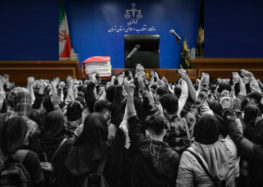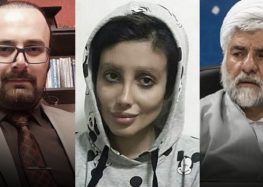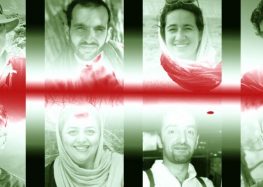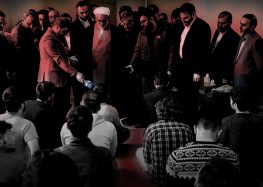Iranian Teens’ Televised “Confessions” For Social Media Postings Prompt Strong Outcry
 IRIB Defends Decision to Air Clips of Teenagers Detained For Expressing Themselves Online
IRIB Defends Decision to Air Clips of Teenagers Detained For Expressing Themselves Online
An Iranian charity for children has condemned Iran’s state-run broadcasting organization for airing the “confessions” of teenage girls and boys who had been arrested by the police and accused of public indecency.
The police have meanwhile claimed that the teenagers were not crying while they were being interviewed, while the Islamic Republic of Iran Broadcasting (the IRIB) has defended its decision to air the confessions, claiming it had been urged to by Iran’s judiciary and by viewers.
Videos of 18-year-old Maedeh Hojabri dancing in her bedroom to Western and Iranian music went viral on social media in early July 2018 after news of her arrest made international headlines.
The exact date of her arrest along with at least three other teenage social media personalities is not clear but videos of them “confessing” to posting images and videos of themselves on social media were aired during an the IRIB program on July 6.
the IRIB has a long history of broadcasting forced confessions. Typically well-staged productions, they are used to defame dissidents, intellectuals, and other individuals whom the authorities wish to discredit, legitimize their prosecution, and amass public support for their sentences.
On July 9, Iran’s Society for Protecting the Rights of the Child issued a statement blasting the the IRIB program for its “clear and obvious example of violence against children.”
“These unjustified and humiliating actions, especially toward minors, … are considered psychological child abuse and those responsible can be taken to court through direct complaints by members of the public,” continued the statement.
The police responded by claiming the crying had been edited into the video.
“The clip, which has been published on social media, does not belong to that person [Maedeh Hojabri] and the crying sound was added from somewhere else,” said the Police Information Office in a statement on July 10.
“That particular person was summoned based on a judicial order and public requests and she was immediately released the same day after expressing remorse,” added the statement. “She was never detained.”
The faces of the three teenage girls and a boy who appeared on the IRIB’s “Biraheh” (“Wrong Path”) program on July 6 are blurred but their voices and crying do not seem to be doctored.
Fearing Persecution, One Teenager Flees Iran
Elnaz Ghasemi later confirmed that she, Hojabri and a third girl, Shadab Shakib, were all present when they were interviewed in front of a camera in June 2018 after being arrested by the cyber police force (FATA) for posting “indecent” images on social media.
Hojabri and Shakib were released on bail after a day and Ghasemi after three days, she added in a brief video clip posted on Twitter on July 9.
Ghasemi said she is now in Canada with her family and will not be returning to Iran. “I preferred not to live there [in Iran] because in some ways I couldn’t,” she said.
A young boy was also forced to make confessions about his online postings but his identity has not been made public. On social media he is being referred to as “Kami.”
The IRIB Plays Victim
The head of the IRIB’s Public Relations Office, Mohammad Hossein Ranjbaran, has defended the organization’s decision to air the program and claimed the IRIB suffered “spiteful attacks from inside and outside” because of it.
“According to conversations I had with police officials today [July 10], these individuals [teenagers] had been served judicial orders and the judicial authority insisted that they should be exposed to the media,” Ranjbaran told reporters.
“Virtually any ordinary person can see that this wave of media attacks against the national broadcasting organization is out of the ordinary and the criticisms have been far from fair,” he added.
Ranjbaran also claimed viewers had urged the IRIB to make the program.
“We are getting calls from some families, who are not even religious, frankly begging us to make programs that would put a stop to this uncontrollable situation in cyber space and protect family decency and respect,” Ranjbaran said.
The comments marked a rare instance when the state-run the IRIB has bothered to respond to criticism—an indication of the high level of public outcry.
In the beginning of the 27-minute program aired on July 6, viewers were informed that it was a joint production between the IRIB and the police.
The four disguised subjects—three girls and a boy whose faces are either out of focus or kept in the dark—answered questions about their motives for posting images and videos of themselves on social media.
The next day, Tehran Police Chief Col. Touraj Kazemi warned the public that law enforcement officials would pursue Iranian “linchpins” running popular pages on Instagram that contain material against the laws and ethics of the Islamic Republic of Iran.
“More than 30 percent of these cases that are being handled by the police are in Tehran and a third of them have led to results and those in charge of these pages have been summoned and dealt with,” Kazemi said.
Iranian Political Personalities Decry the IRIB Program
Prominent Iranian political personalities have strongly criticized the police and the IRIB for detaining the teenagers and airing the program. In particular they criticized the IRIB for treating real criminals with more respect than the innocent teenagers.
Mahmoud Sadeghi, a reformist member of Iran’s Parliament, made a comparison between the IRIB’s treatment of Saeed Tousi, a disgraced Quran reciter who many argue was unfairly acquitted of child sexual abuse, and the young social media personalities.
“I suggest the honorable director of the the IRIB also issue an order to interview the Quran teacher’s sexual abuse victims,” Sadeghi tweeted on July 9.
Former reformist Vice President Mohammad Ali Abtahi, tweeted: “They want to bring down the linchpins on Instagram but instead they have humiliated a couple of young dancers who ‘voluntarily’ came on TV and drove them to tears. It’s not surprising that they don’t bring down international thieves and incompetent managers; after all, they only dance for their masters!”
In an op-ed for Etemad newspaper, reformist political commentator Abbas Abdi wrote: “Those who aired this program should accept responsibility for its consequences. There is no benefit in arresting people for these things and forcing them to repent. It is psychologically destructive to bring someone on television and make them cry. Everyone will say: ‘Why don’t you do this to thieves and embezzlers?’”
Former opposition leader Zahra Rahnavard told the Kalame website, “The head of the the IRIB should apologize to the shared conscience of the people of Iran. In its dreadful interview, the the IRIB displayed how it shredded the spirit of a young girl. For how long do we have to witness such behavior against humanity and youthfulness?”
Lawmaker Mohammad Ali Vakili told the state-funded Iranian Students News Agency, “At a time when the country is in crisis, airing these kinds of programs on television shows that the officials are having a problem identifying current priorities.”






